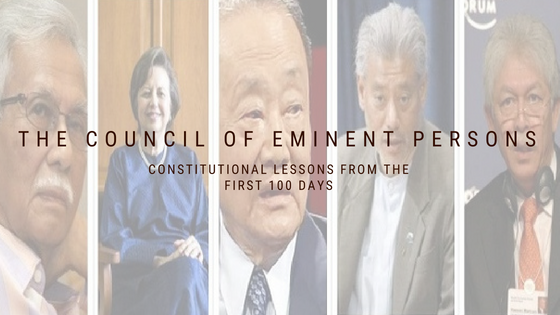|
The Council of Eminent Persons consists of former finance minister Daim Zainuddin, central bank governor Zeti Akhtar Aziz, business tycoon Robert Kuok, prominent economist Jomo Kwame Sundaram and former CEO of state oil company Petronas Hassan Marican.
I. INTRODUCTION The first 100 days of the Pakatan Harapan government have passed, and with it, any remaining traces of post-election euphoria. Amongst controversies on the new government’s actions (or lack thereof), concerns regarding the Council of Eminent Persons (CEP) stand out. This is undoubtedly due to its prominent position close to the levers of power in Putrajaya. In particular, many have begun to question its role in a maturing administration with a fully-constituted Cabinet. Such disillusionment has recalled doubts regarding its legal status, and whether its existence is contrary to constitutional principles. This essay will address both concerns in turn; arguing that the Council’s existence is both legally and normatively legitimate, before exploring the more crucial issue of how it — and the government — ought to be held accountable. Finally, it will discuss potential options for executive branch policy councils, concluding that a hybridised approach combining the structure of the National Economic Council (NEC) and Domestic Policy Council (DPC) in the United States with the treatment of special advisers as ‘temporary civil servants’ in the United Kingdom is ideal.
1 Comment
|
Search by typing & pressing enter


 RSS Feed
RSS Feed